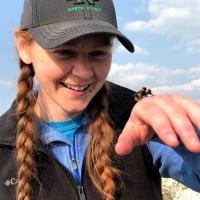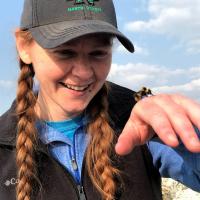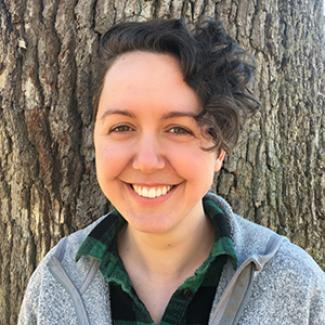The Bumble Bee Atlas is a community science effort that aims to track and conserve native bumble bees. This two-hour workshop is intended for new and returning participants who wish to take part in the 2024 season of the Minnesota Bumble Bee Atlas and Iowa Bumble Bee Atlas. During this webinar, we will provide clear guidance on how to participate in the Atlas and discuss priorities for the 2024 field season. The training will cover how to conduct your own survey, where and when to survey, what supplies you'll need, and how to submit your data. We will also cover identification of the common bumble bee species you'll encounter in the field.
This webinar will serve as the last of our two-part training series. Before attending this webinar, please watch part one of the training series, "Ecology and Conservation of Bumble Bees,” taking place on April 13, 2024.
The Minnesota Bumble Bee Atlas is a collaboration the University of Minnesota, the Minnesota Department of Natural Resources, and the Xerces Society. The Iowa Bumble Bee Atlas is a collaboration between Iowa State University, the Iowa Department of Natural Resources, and the Xerces Society.
This webinar will be recorded and available on our YouTube channel.
Learn more and register today!
Speakers:
- Genevieve Pugesek - Xerces Society
- Katie Lamke - Xerces Society
- Dr. Elaine Evans - University of Minnesota
- Elise Bernstein - University of Minnesota

Genevieve Pugesek - Endangered Species Conservation Biologist, Midwest Bumble Bee Atlas - Xerces Society
Genevieve is one of the project managers of the Bumble Bee Atlas, a community science project aimed at tracking and conserving bumble bees. She works with Atlas programs in Missouri, Nebraska, Iowa, and Minnesota. She is broadly interested in conservation biology, land management, and animal natural history. She earned her Ph.D. at Tufts University, where she studied the nesting and overwintering ecology of bumble bees. Prior to working at Xerces, Genevieve worked as a postdoc at UW-Madison, studying the effects of prescribed fire in oak savannas on bumble bee abundance. Outside of work, Genevieve enjoys baking, painting, and spending time outside.
Katie Lamke - Endangered Species Conservation Biologist, Midwest Bumble Bee Atlas - Xerces Society
Katie joined the Xerces Society in 2019 to work on bumble bee conservation initiatives. Based in Nebraska, her main role is to coordinate and engage people in the Midwest's numerous Bumble Bee Atlas efforts. Working with community scientists, researchers, agency and NGO staff, she helps develop tools that drive bumble bee conservation. Katie earned her master's degree in entomology from the University of Nebraska-Lincoln, where she compared wild bee diversity and their floral associations between remnant and restored tallgrass prairies. She is enthusiastic about pollinator ecology and is committed to raising awareness about the conservation of wild bees. Outside of work, Katie enjoys birding, gardening, skating, and, well, looking for bees.



